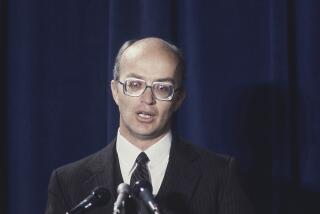Eugene Rostow, 89; Yale Dean, Defender of U.S. on Vietnam
- Share via
Eugene V. Rostow, an influential figure in and out of government who served in the State Department, where he was a strong defender of U.S. policy in Vietnam, has died. He was 89.
Rostow, who in his last government assignment was director of the Arms Control and Disarmament Agency under President Reagan, died Monday at an assisted living facility in Alexandria, Va. The cause of death was congestive heart failure, family members said.
In the mid-1960s, Rostow -- and his more influential brother, Walt W. Rostow -- were leading figures in the growing U.S. involvement in Vietnam. As national security advisor to President Lyndon B. Johnson, Walt Rostow was the architect of much of the U.S. policy in Southeast Asia. Eugene Rostow defended that policy from his position as undersecretary of State for political affairs.
His defense of the administration’s position in Vietnam was not based so much on morality as on law, his son Victor told the Associated Press, including obligations under international treaties to stop the communist insurgency.
Eugene V. Rostow was born in Brooklyn, N.Y., to parents who were politically active. His father was a socialist who named his son after Eugene V. Debs, the Socialist Party presidential candidate.
A Phi Beta Kappa, Rostow graduated from Yale in 1933 and went on to study economics at King’s College at Cambridge University.
He returned to Yale to study law and was editor of the university’s law journal. After graduating, he joined a New York law firm but returned to Yale as a faculty member in 1938. He became a full professor in 1944.
Back problems kept Rostow out of the military during World War II, but he took a leave of absence from Yale and served in the Office of Lend-Lease Administration.
During the war, Rostow was an early critic of the Supreme Court’s ruling that supported the internment of Japanese Americans.
He once said that many were being sent to camps “on a record which wouldn’t support a conviction for stealing a dog.”
He wrote an influential paper for the Yale Law Review in 1945, which was subsequently credited with helping fuel efforts to provide interned Japanese Americans with restitution.
Rostow was named dean of the Yale Law School in 1955. As dean, he recruited a number of influential legal scholars and, with the aid of a $1.6-million Ford Foundation grant, helped refocus the school’s curriculum. The new program, which began in 1956, emphasized the teaching of law as it related to other areas, such as history, philosophy, politics and sociology.
“Our purpose,” Rostow said of the program, “is to train lawyers, law teachers and public servants who will be capable of constructive leadership in American life.”
On Monday, Anthony Kronman, the dean of Yale Law School, recalled Rostow as one the school’s “great deans.”
“Much of the Yale Law School we now know -- to which we have become so accustomed by the passage of time -- was built or rebuilt during Gene’s deanship years,” Kronman said. “Gene’s intellect, will and character were molding forces in the evolution of the modern Yale Law School, and his legacy is all about us.”
After leaving Yale, Rostow was named undersecretary of State in 1966. He held the post until 1969.
“I think he saw our treaty obligations as the fundamental principle,” his son Victor told the Washington Post this week, explaining his father’s support for the U.S. escalation in Vietnam. “Beyond that, he also believed that if we could establish a breathing space for South Vietnam that they would govern themselves in a manner that would be a good deal more pleasant and effective for the people of Vietnam than what transpired.”
Through the 1970s, Rostow focused as a private citizen on nuclear proliferation issues. He wrote extensively and was a member of the Committee on the Present Danger.
Though a lifelong Democrat, Rostow joined the Republican Reagan administration in 1981 as head of the Arms Control and Disarmament Agency. But by 1983, Rostow was forced out of the job after senior administration officials deemed him insufficiently hawkish.
In the early 1990s, he served as a fellow at the U.S. Institute for Peace in Washington.
He will be buried in Vermont today.
In addition to his son Victor and his brother Walt, Rostow is survived by his wife, Edna, a psychotherapist; a daughter, Jessica; another son, Nicholas; another brother, Ralph Emerson Rostow; and six grandchildren.
More to Read
Sign up for Essential California
The most important California stories and recommendations in your inbox every morning.
You may occasionally receive promotional content from the Los Angeles Times.











